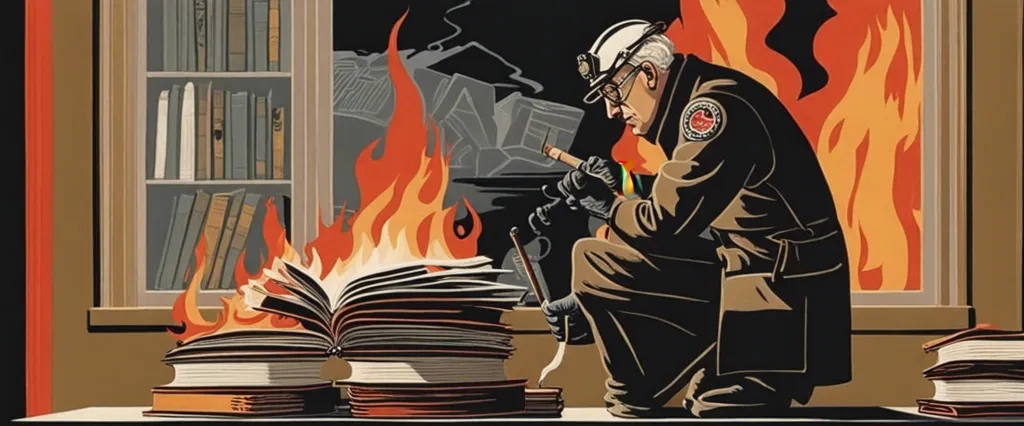
In the realm of dystopian literature, Ray Bradbury and George Orwell have established themselves as towering figures. With their groundbreaking works, Fahrenheit 451 and Animal Farm, Bradbury and Orwell successfully crafted prophetic tales set in authoritarian societies that eerily mirror aspects of our own reality. Published within a few years of each other in the mid-20th century, these novels delve into the realms of dystopia and utilize satire to reflect upon societal issues of the time. While Fahrenheit 451 critiques censorship and the role of technology in dehumanization, Animal Farm explores political corruption and the dangers of totalitarianism. Despite their divergent plots and settings, both authors share a fundamental desire to shed light on the dangers inherent in human nature and the potential bleak paths societies can take.
Ray Bradbury’s Fahrenheit 451 transports readers to a futuristic American society where books are outlawed, and the populace is distracted by an endless barrage of mindless entertainment. The protagonist, Guy Montag, is a fireman who, paradoxically, is tasked with burning books rather than extinguishing fires. Bradbury uses Montag’s journey of self-discovery as a means to explore the potential consequences of the society’s obsession with instant gratification and relentless pursuit of happiness. Fahrenheit 451 boldly questions the value of knowledge, the dangers of conformity, and the repercussions of suppressing free thought.
On the other hand, George Orwell’s Animal Farm paints a captivating picture of an animal-led revolution against human oppression. Initially united under the shared goal of creating an egalitarian society, the animals overthrow their human oppressors and establish Animal Farm. However, as time progresses, the pigs, led by Napoleon, gradually seize power, imposing their own despotic regime. Orwell uses these intelligent and power-hungry pigs as a metaphor for the inevitable corruption of any revolution or idealistic movement. Animal Farm serves as a scathing critique of Stalinism and the potential pitfalls of unchecked political power.
Objectives of the Comparative Study:
In this comparative study, we aim to analyze and compare the themes, narrative devices, and underlying messages employed by Ray Bradbury and George Orwell in Fahrenheit 451 and Animal Farm respectively. By exploring their similarities and differences, we will gain insights into the societal issues each author sought to address and the unique methods they employed to portray dystopia and satire. Additionally, we will examine how Bradbury and Orwell’s works resonate with contemporary readers and remain relevant in the face of changing political and social landscapes.
As we embark on this comparative journey, it becomes apparent that both Fahrenheit 451 and Animal Farm are literary masterpieces that propel readers into a tumultuous world plagued by authoritarianism and suppression. By delving into the heart of these narratives, we will unravel the complexities of Bradbury and Orwell’s insights, understanding the philosophical questions they pose and the warnings they issue. Through this in-depth exploration, we hope to gain a deeper appreciation for the power of dystopian literature and recognize its relevance in our present-day society.
Brief Summary of Two Books
Fahrenheit 451 by Ray Bradbury
Fahrenheit 451″ by Ray Bradbury is set in a dystopian future society where books are banned and burned to suppress independent thinking and maintain societal control. The protagonist, Guy Montag, is a fireman whose job is to burn these forbidden books. Dissatisfied with his life, Montag starts questioning the purpose of his actions and the emptiness of his society.
Montag meets a young neighbor named Clarisse, who introduces him to the power of questioning and critical thinking. Her influence prompts Montag to reevaluate his life, leading to a series of events that challenge the oppressive state he lives in. He hides books in his home, even though possessing them is considered a serious crime.
Montag’s internal conflict intensifies as he witnesses the tragic consequences of a society devoid of literature. His wife, Mildred, who is deeply immersed in the shallow entertainment provided by technology, is eventually unable to cope with Montag’s growing unrest.
Montag finds solace in an underground community of book lovers who are committed to preserving literature and knowledge. However, the government discovers their activities and launches a full-scale crackdown. The city is bombarded with a series of bombings, distracting the authorities and allowing Montag and the book lovers to escape.
In the aftermath, Montag’s city is destroyed, and he joins a group of intellectuals who are committed to rebuilding society through the power of literature. They memorize books to preserve knowledge for future generations and to ensure that society does not forget the importance of independent thinking and the freedom offered by literature.
Animal Farm by George Orwell
Animal Farm by George Orwell is a satirical allegorical novella that explores the danger of political corruption and the power of propaganda. The story is set on Manor Farm, where the animals rise up and overthrow the cruel human farmer, Mr. Jones, led by the pigs, Napoleon and Snowball. They establish Animal Farm, a utopian society based on the principles of equality and fairness.
Initially, things go well as the animals work together to build a new society. They adopt various commandments, including “Four legs good, two legs bad,” to guide their behavior. However, power soon corrupts the pig leaders, and they begin to break the commandments to suit their own interests.
Napoleon, a ruthless and manipulative leader, takes control of the farm and establishes a totalitarian government. He dictates all decisions and rules through his propaganda-spreading pig, Squealer. The other animals work hard, while the pigs live luxuriously and engage in human-like behaviors.
As time passes, the commandments are altered to favor the pigs, and the animals’ memory of the past becomes manipulated. Eventually, the original principles of Animal Farm are completely discarded, and the pigs become indistinguishable from their human oppressors.
Through the narrative, Orwell criticizes the corruption of the Russian Revolution and warns against the dangers of totalitarianism and the abuse of power. The story serves as a reminder of how easily noble ideals and revolutions can be subverted by those in authority.
Comparison between Two Books

Similarities in Authority
In both Fahrenheit 451 by Ray Bradbury and Animal Farm by George Orwell, the theme of authority and its effects on society play a significant role. Despite their different settings and premises, there are notable similarities between the two works regarding the portrayal and consequences of authority.
1. Abuse of Power: In both novels, those in positions of authority abuse their power for personal gains. In Fahrenheit 451, the government controls and manipulates society through censorship and the burning of books, restricting individual freedom in the process. Similarly, in Animal Farm, the pigs gradually seize power from the other animals after the revolution, eventually adopting human-like behaviors and exploiting the lower-class animals for their own benefits.
2. Manipulation and Control: Authority figures in both novels skillfully manipulate the masses to maintain control. In Fahrenheit 451, the government-controlled media bombards individuals with mindless entertainment and propaganda, ensuring their conformity to the status quo. In Animal Farm, the pigs manipulate language and propaganda to shape the animals’ perception of reality, controlling their thoughts and actions to maintain their dominance on the farm.
3. Suppression of Individuality: Authority in both novels suppresses individuality and independent thinking. In Fahrenheit 451, the government discourages intellectual pursuits, such as reading and critical thinking, to maintain conformity and prevent rebellious ideas from arising. Similarly, in Animal Farm, the pigs impose strict rules and regulations, stifling the animals’ creativity and forcing them into unquestioning obedience.
4. Fear and Intimidation: Both novels depict authority figures using fear and intimidation to maintain control and prevent resistance. In Fahrenheit 451, the firemen’s role is to instill fear by burning books and threatening dissenters, thereby ensuring compliance through terror. In Animal Farm, the pigs employ their fierce dogs as enforcers, using them to intimidate and oppress dissenting animals, preventing any opposition to their authority.
5. Division and Fragmentation: Authority figures in both novels actively promote division among the populace to maintain their power. In Fahrenheit 451, society is intentionally fragmented by discouraging meaningful human connections and promoting superficial entertainment, making it easier for the government to control the isolated individuals. Similarly, in Animal Farm, the pigs exploit the ignorance and differences between the animals to create divisions, preventing any united opposition to their rule.
Overall, Fahrenheit 451 and Animal Farm share striking similarities concerning authority and its impact on society. Both novels highlight the abuse of power, manipulation and control strategies, the suppression of individuality, fear tactics, and the promotion of division. Through these similarities, the authors paint a cautionary picture of the dangers posed by unchecked authority and the consequences it can have on society.
Divergences in Authority
Fahrenheit 451 and Animal Farm are both dystopian novels that highlight the dangers of oppressive authority. While they share similar themes of government control and censorship, they diverge in their approaches to addressing authority and the ultimate outcome for their characters.
In Fahrenheit 451, Ray Bradbury portrays a futuristic society where books are outlawed, and firemen are tasked with burning any discovered literature. Here, authority is depicted as a faceless entity manipulating people’s lives through constant surveillance and propaganda. The government maintains control by suppressing independent thought and individuality, ensuring conformity among its citizens. The protagonist, Guy Montag, initially embraces this authority, blissfully ignorant of its consequences. However, his encounters with rebellious individuals awakening his curiosity and dissatisfaction, prompting him to question authority and search for personal freedom within a society devoid of intellectual stimulation.
On the other hand, Animal Farm by George Orwell uses allegory to represent the rise and corruption of totalitarian regimes. The book is set on a farm where animals overthrow their human oppressors, hoping to create a fair and equal society. Initially, the animals live harmoniously under the authority of the pigs, who adopt the principle of “All animals are equal.” However, over time, the pigs, led by Napoleon, abuse their power and establish a dictatorship, exploiting and manipulating their fellow animals. Orwell’s novel examines the corrupting nature of authority, showing how power can transform even the most well-meaning revolutionaries into oppressive leaders. The divergence here lies in the characters’ awareness of the authority’s true nature. While some animals feel powerless to resist, others, like Benjamin the donkey, recognize the hypocrisy and oppression but choose not to act, emphasizing the fear and passiveness that can exist within those subjugated to authority.
In terms of outcomes, Fahrenheit 451 portrays a glimmer of hope for change and personal growth. As Montag witnesses the consequences of an authority that stifles free thought, he becomes determined to challenge it, ultimately joining a community of individuals who are dedicated to preserving and passing on knowledge. His transformation signals a potential awakening and rebellion against oppressive authority, giving readers a sense of optimism.
Conversely, Animal Farm depicts a bleaker outlook, highlighting a cyclical pattern of power and corruption. The rebellion against authority inadvertently leads to the rise of a new oppressive regime. Orwell suggests that the allure of power is irresistible for some individuals, who are willing to exploit and manipulate others for personal gain. The conclusion of the novel leaves the animals disillusioned and demoralized, suggesting that the corrupting influence of authority is difficult to overcome.
In summary, while Fahrenheit 451 and Animal Farm both explore the dangers of oppressive authority, they diverge in their approaches and outcomes. Bradbury’s novel presents a glimmer of hope and potential for resistance, while Orwell’s work offers a more cynical perspective, emphasizing the cyclical nature of power and corruption. Ultimately, they serve as cautionary tales, reminding readers to be vigilant of authority and the potential for abuse.

Conclusion
Both Fahrenheit 451 by Ray Bradbury and Animal Farm by George Orwell are highly regarded books with important themes and messages. It is subjective to determine which one is more worthy of reading, as both offer valuable insights and provoke critical thinking.
Fahrenheit 451 explores a dystopian society where books are banned and burned. It delves into themes of censorship, freedom of expression, and the dangers of an excessively controlled society. Bradbury’s writing style is imaginative and thought-provoking, often questioning the role of technology and the impact it has on human connection and individuality. The book serves as a warning against complacency and the need to actively fight for intellectual freedom.
On the other hand, Animal Farm is an allegorical novella that uses farm animals to represent different political ideologies and historical events. Orwell critiques totalitarianism and the corruption of power through the rise and fall of an animal-led revolution. Animal Farm reveals the dangers of blind loyalty, manipulation, and the erosion of democratic ideals. It is a powerful examination of oppression, inequality, and the human tendency to abuse authority.
Ultimately, the choice between Fahrenheit 451 and Animal Farm depends on personal preferences and interests. If you gravitate towards dystopian settings and themes of censorship and societal control, Fahrenheit 451 may be more suited for you. Alternatively, if political allegories and explorations of power dynamics intrigue you, then Animal Farm might be the more worthwhile choice. Both books are significant pieces of literature that provide valuable social commentary and are widely studied and praised.



